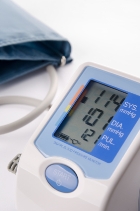 High blood pressure affects up to 25% of the adult population, but almost a third of sufferers have no idea they have it.
High blood pressure affects up to 25% of the adult population, but almost a third of sufferers have no idea they have it.
High blood pressure is very easy to detect – a simple, fast and painless test by your doctor or nurse, or even in your local chemist, can alert you that all is not well inside your arteries. Generally high blood pressure is symptom free – which means you aren’t aware of it, not that it is harmless.
When your heart beats, it pumps blood to your arteries, creating pressure within them. The test for high blood pressure yields two numbers – one that measures the pressure within the artery as the heart beats (systolic) and when it is resting (diastolic). Normal blood pressure is 120/80 and a reading over 140/90 is considered high.
Over time and left untreated, the excessive force exerted against the arteries damages and scars them. It can also damage organs, such as the heart, kidneys, and brain. High blood pressure can lead to strokes, blindness, kidney failure, and heart failure.
Symptoms
High blood pressure can be present with no noticeable symptoms, but there are some indicators. If you suffer from any of the following, get your blood pressure checked. They may also indicate other diseases or conditions, so do not ignore them.
- frequent or severe headaches
- unexplained fatigue
- dizziness
- flushed face
- ringing in the ears
- thumping in the chest
- frequent nosebleeds
High blood pressure (or hypertension) may be treated with medication, which you should discuss with your GP.
You will be more likely to develop high blood pressure if there is a history of it in your family, and as you age. While we have no control over heredity or aging, many of the risk factors associated with high blood pressure can be controlled through sensible lifestyle choices.
Maintain a healthy body weight
Those who are overweight will be more likely to suffer from high blood pressure, as are those who live a sedentary lifestyle. Get moving and eat well.
Excessive salt intake is not good for your blood pressure. Up to 80% of our sodium intake is hidden in processed food. Fruit, vegetables and lean protein are great for your whole system and don’t come laden with salt.
Excessive alcohol consumption will also elevate your blood pressure.
Give up smoking
Giving up smoking will reduce your risk of developing high blood pressure, along with a myriad of other health problems.
Natural support
To reduce high blood pressure, it’s important to eat fewer foods rich in sodium, while increasing the amount of potassium, calcium, and magnesium in your diet. Most vegetables and fruits in the garden are rich in potassium. Broccoli and dark leafy greens are full of magnesium and calcium.
Celery has been found to contain a substance that manages/lowers blood pressure; the Chinese have used celery for this purpose for centuries in their traditional medicine.
Garlic helps lower blood pressure by keeping the arteries clear of cholesterol and potential plaque buildup. It also decreases blood clotting and widens the arteries. Hawthorn berries and ginkgo biloba are reputed to dilate arteries, too, making the heart’s job of pushing blood through them a little easier.
Relax
High stress levels will also elevate your blood pressure.
Passion flower, valerian, limeflower (Tilia cordata), and lemon balm have sedative properties, so if your blood pressure condition is thought to be connected to stress and anxiety, tranquilizing herbs such as these can lend a hand. Valerian also relaxes the smooth muscles that line the artery walls, preventing them from constricting.
Exercise will help manage stress levels, as will addressing the underlying causes of the stress.









Join the Discussion
Type out your comment here:
You must be logged in to post a comment.